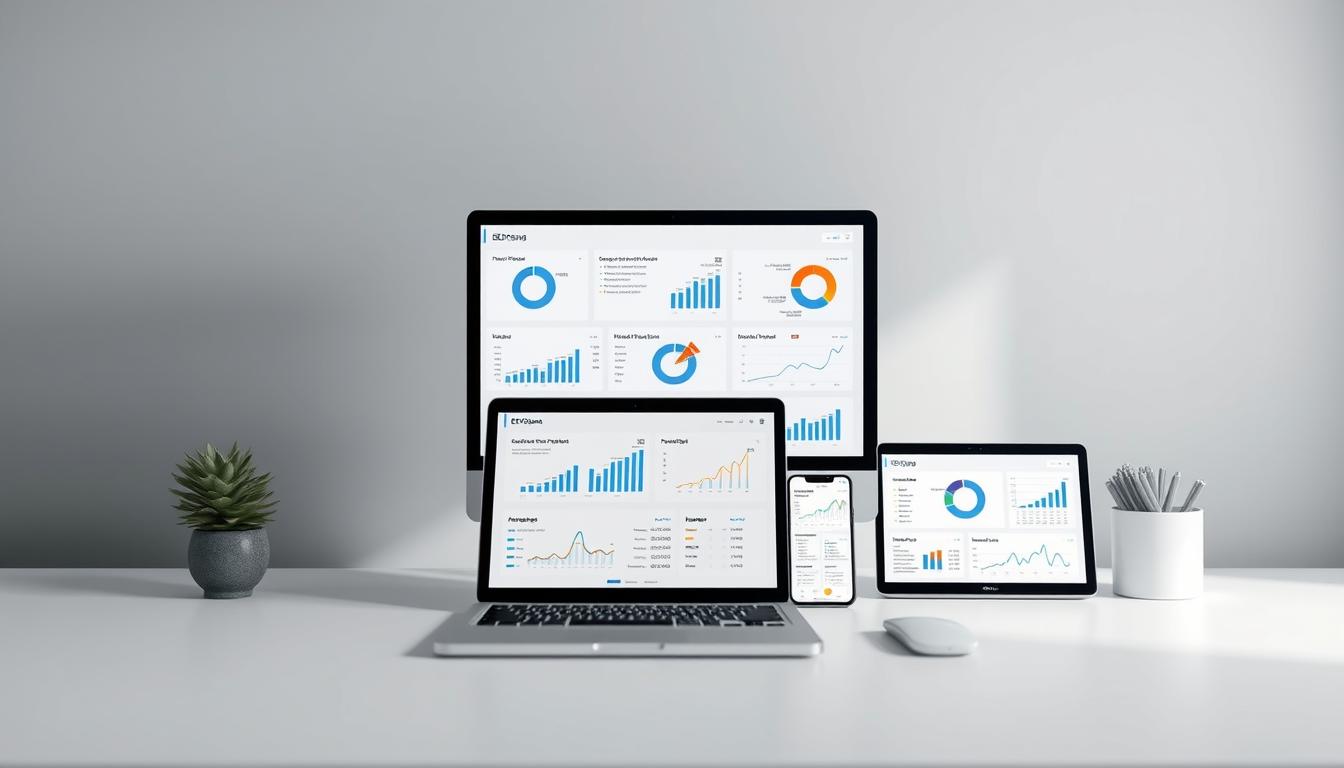
Professional SEO Analysis | White Sand India – Expert Solutions
In today’s digital landscape, a robust online presence is crucial for businesses in India to stay competitive. At Whitesand India, we specialize in providing expert SEO analysis solutions that help businesses improve their online visibility and search engine rankings.
Our comprehensive SEO analysis services cover on-page elements, off-page factors, and technical aspects of website optimization, ensuring that our clients’ websites are optimized for search engines. By analyzing content, meta tags, and backlinks, we identify areas for improvement and provide data-driven insights to drive organic traffic and boost conversion rates.
For more information on our services, please contact us at deepali@whitesand.co.in or (+91)98259-40020. Visit our website at https://whitesand.co.in/.
Key Takeaways
- Understanding the importance of SEO analysis in digital marketing
- How Whitesand India’s expert SEO analysis solutions can improve online visibility
- The comprehensive nature of our SEO analysis services
- The role of data-driven insights in driving organic traffic and conversion rates
- Improving search engine rankings through optimized website content and meta tags
Understanding the Importance of SEO Analysis
In today’s digital landscape, understanding the importance of SEO analysis is crucial for businesses aiming to succeed online. SEO analysis is the systematic evaluation of a company’s search engine optimization efforts, ensuring its effectiveness and identifying areas of improvement in the website’s SEO.
What Makes SEO Analysis Critical for Online Success
SEO analysis is vital because it helps businesses navigate the complex digital market in India. By understanding their online presence, companies can identify opportunities to improve their search engine rankings.
The unique aspects of the Indian digital market require a tailored approach to SEO analysis. Factors such as regional preferences and search behaviors play a significant role in determining the effectiveness of a company’s online strategy.
- Understanding regional preferences and search behaviors
- Improving online visibility in local and global markets
- Driving targeted traffic and enhancing brand credibility
How SEO Analysis Impacts Your Business Growth in India
SEO analysis significantly contributes to business growth by driving targeted traffic, improving conversion rates, and enhancing brand credibility. By understanding their target audience, businesses can tailor their online strategies to meet the specific needs of their customers.
| SEO Analysis Benefits | Impact on Business |
|---|---|
| Improved Search Engine Rankings | Increased Online Visibility |
| Targeted Traffic | Higher Conversion Rates |
| Enhanced Brand Credibility | Competitive Edge in the Market |
For personalized SEO analysis services in India, contact us at deepali@whitesand.co.in. Our expertise can help your business grow by optimizing your online presence and improving your search engine rankings.
What Is Professional SEO Analysis?
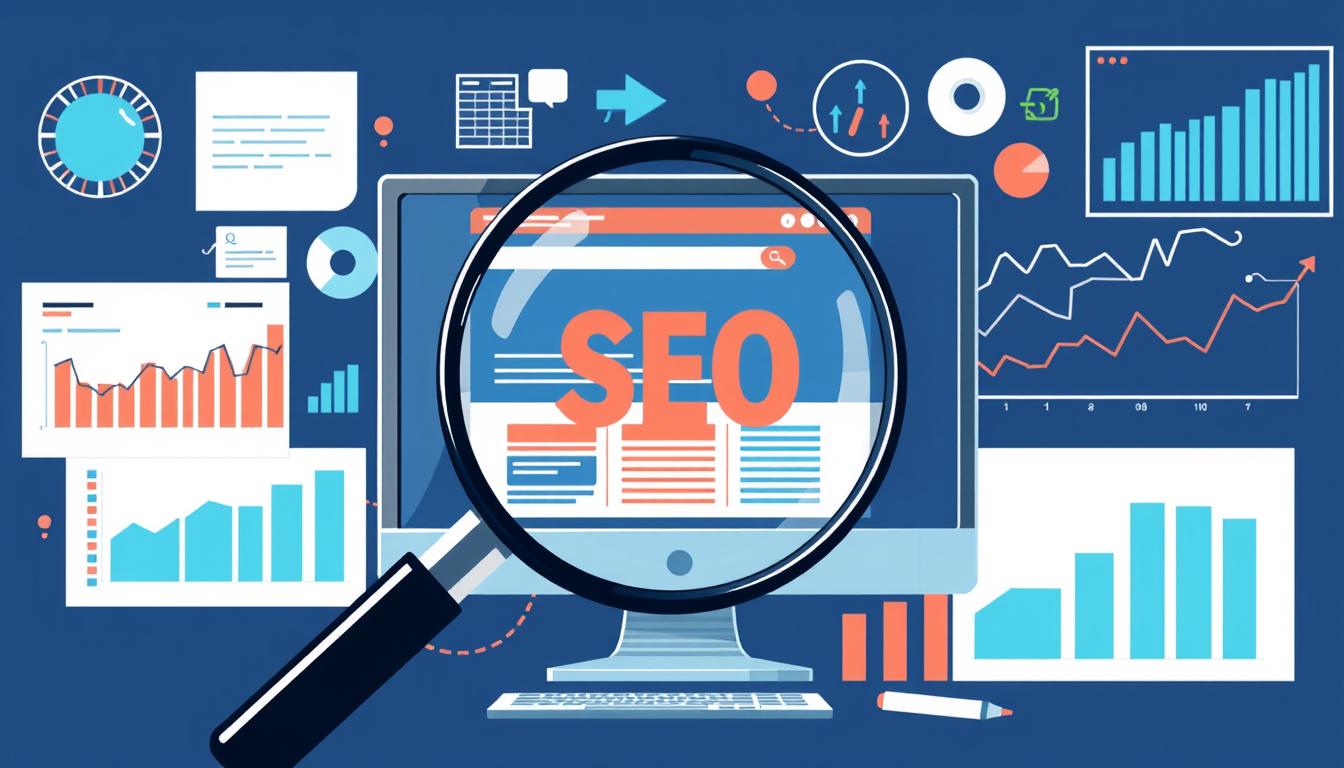
A professional SEO analysis is a detailed assessment that examines various aspects of a website’s SEO to identify areas for improvement. This comprehensive evaluation ensures the effectiveness of a website’s search engine optimization efforts, enhancing its visibility on search engines.
SEO analysis involves assessing three primary components: On-page SEO elements, Off-page SEO elements, and Technical SEO elements. On-page SEO includes internal website factors that can be directly optimized, such as content quality, keyword usage, and meta tags. Off-page SEO involves activities outside the website, like backlink building and social media presence. Technical SEO focuses on the website’s backend, including site speed, mobile responsiveness, and crawlability.
Definition and Core Components
The core of a professional SEO analysis lies in its ability to provide a holistic view of a website’s SEO performance. It is not just about identifying issues but also about understanding the SEO landscape and how different elements interact. This involves using various tools to analyze data and provide actionable insights.
A professional SEO analysis is characterized by its depth and the expertise involved. It’s a customized approach that considers the unique aspects of a business, its industry, and target audience. Unlike basic SEO checks, a professional analysis provides comprehensive insights that are not limited to automated tool outputs or basic SEO audit reports.
Professional vs. Basic SEO Analysis
While basic SEO checks can identify glaring issues, a professional SEO analysis goes much deeper. It involves human expertise and judgment, which are crucial for understanding the nuances of SEO and making informed decisions. A professional analysis considers both the current performance and future potential of a website, helping businesses develop long-term SEO strategies.
In contrast, basic SEO audits might overlook critical issues or fail to provide the context needed for strategic decision-making. By choosing a professional SEO analysis, businesses can gain a competitive edge in the Indian market, where search engines play a pivotal role in driving traffic and sales.
The Three Pillars of Comprehensive SEO Analysis
A comprehensive SEO analysis is built on three foundational pillars that work together to enhance a website’s search engine rankings. These pillars are crucial for a successful SEO strategy, as they address different aspects of a website’s performance and visibility.
On-Page SEO Elements
On-page SEO elements refer to the factors within a website that impact its search engine ranking. These include keyword optimization, content quality, meta tags, header tags, and internal linking. We analyze these elements to ensure they are optimized for both users and search engines. Key factors include:
- Keyword usage and density
- Content relevance and quality
- Meta title and description optimization
- Header tag structure
- Internal linking strategy
By optimizing these on-page elements, we can significantly improve a website’s visibility and ranking on search engines.
Off-Page SEO Elements
Off-page SEO elements are factors outside of a website that influence its search engine ranking. The most significant off-page factor is backlinks from other reputable sites. We assess the quality and quantity of backlinks to determine their impact on the website’s authority and ranking. Other off-page elements include:
- Backlink quality and quantity
- Social media presence and engagement
- Local SEO and directory listings
- Brand mentions and online reputation
By building a strong off-page SEO presence, we can enhance a website’s credibility and improve its search engine rankings.
Technical SEO Elements
Technical SEO elements evaluate a website’s backend, code, and structure for performance improvements in search engine rankings. This includes site speed, mobile-friendliness, indexability, and site architecture. We analyze these technical factors to identify issues that may prevent search engines from properly crawling and indexing a website. Key technical elements include:
- Site speed and performance optimization
- Mobile responsiveness and usability
- Indexability and crawlability
- Site architecture and structure
By addressing technical SEO issues, we can ensure a website is optimized for search engines, improving its visibility and ranking.
In conclusion, a comprehensive SEO analysis that covers on-page, off-page, and technical SEO elements provides a holistic approach to improving a website’s search engine rankings. By understanding and optimizing these three pillars, we can develop a robust SEO strategy that drives business growth.
Step-by-Step Guide to Conducting Professional SEO Analysis
Conducting a professional SEO analysis is a crucial step in enhancing your website’s search engine ranking. This process involves several key steps that help you understand your website’s strengths and weaknesses, identify areas for improvement, and develop a strategy to boost your online presence.
Preparing for Your SEO Analysis
Before diving into the SEO analysis, it’s essential to prepare your website and gather relevant data. This includes reviewing your website’s current performance, identifying your target audience, and understanding your business goals. By doing so, you can ensure that your SEO analysis is focused and effective.
We recommend starting by reviewing your website’s current search engine rankings, traffic, and engagement metrics. This will provide a baseline understanding of your website’s performance and help you identify areas that need improvement.
Essential Tools and Resources
To conduct a comprehensive SEO analysis, you’ll need the right tools and resources. SEO tools like Ahrefs, Majestic, Moz, Semrush, Google Search Console, Google Lighthouse, and Google Analytics provide valuable insights into your website’s performance. These tools can help you identify technical SEO errors, analyze backlinks, and track keyword rankings.

By leveraging these tools, you can gain a deeper understanding of your website’s strengths and weaknesses and develop a data-driven SEO strategy.
Setting Clear Objectives and KPIs
Setting clear, measurable objectives is critical to a successful SEO analysis. This involves identifying your SEO goals, such as improving search visibility, increasing organic traffic, or enhancing conversion rates. You should also establish key performance indicators (KPIs) to track your progress, including keyword rankings, organic traffic, bounce rate, and conversion metrics.
- Identify common SEO objectives, such as outranking competitors or improving search visibility.
- Establish realistic benchmarks and targets based on industry standards and historical performance.
- Prioritize objectives based on potential impact and resource requirements.
- Document objectives and KPIs to ensure clarity and accountability throughout the SEO analysis process.
Analyzing Your Website’s Current Search Visibility
Understanding your website’s current search visibility is crucial for determining its online presence. To effectively analyze this, we need to see where your website ranks on Google search results. This gives us a better understanding of its current SEO performance and whether improvements are needed.
One of the most efficient ways to analyze search visibility is by using Google Search Console. This tool allows us to view your website’s current SERP position and the number of impressions across different web pages. We can also identify sitemap errors that might be affecting Google’s ability to crawl your website and display it in search results.
Using Google Search Console for SERP Analysis
Google Search Console is a powerful tool for analyzing your website’s search performance. By leveraging its features, we can gain insights into how your website is performing in search engine results pages (SERPs). This includes understanding your website’s average position, click-through rates, and the number of impressions it receives.
- Monitor your website’s SERP position and adjust your SEO strategies accordingly.
- Identify and fix sitemap errors to improve crawlability.
- Analyze the performance of different web pages to understand which ones need optimization.
Tracking Geographic Performance in Indian Markets
For businesses targeting the Indian market, understanding geographic performance is vital. Google Search Console and Google Analytics can help us analyze search performance across different regions in India. This information is crucial for identifying opportunities to target specific regions or cities based on search performance data.
By analyzing language preferences and search behavior across different Indian states, we can develop localized SEO strategies that cater to the diverse needs of the Indian audience. This involves optimizing content and keywords for specific regional markets within India to maximize visibility and relevance.
- Use geographic performance data to inform localized SEO strategies.
- Optimize content and keywords for specific regional markets.
- Analyze language preferences to better serve the diverse Indian audience.
For specialized SEO analysis services tailored to the Indian market, contact Whitesand India at (+91)98259-40020. Our expertise can help you improve your website’s search visibility and drive more traffic to your site.
Keyword Analysis and Strategy Development
Effective keyword analysis is the cornerstone of a successful SEO strategy, enabling businesses to understand what Indian audiences are searching for online. By identifying and targeting the right keywords, businesses can significantly improve their search engine rankings, drive more relevant traffic to their websites, and ultimately boost conversions.
We will explore the importance of keyword analysis in developing an effective SEO strategy tailored to the Indian market. This involves understanding the search behavior of your target audience, identifying high-value keywords, and monitoring their performance.
Identifying High-Value Keywords for Indian Audiences
Identifying high-value keywords requires a deep understanding of your target audience in India. This involves researching keywords that are relevant to your business, product, or service, and analyzing their search volume, competition, and potential to drive conversions.
We use tools like Google Keyword Planner, Ahrefs, and SEMrush to identify keywords that have a high search volume and are less competitive, providing a better chance of ranking higher in search engine results. Additionally, understanding the nuances of Indian languages and regional search trends can further refine your keyword strategy.
Monitoring Keyword Performance
Monitoring keyword performance is crucial to understanding the effectiveness of your SEO strategy. By tracking metrics such as search rankings, click-through rates (CTR), and conversion rates, we can gauge the success of our keyword targeting efforts.
Tools like Google Search Console provide valuable insights into how your website is performing for specific keywords, helping us to adjust our strategy as needed. Regular monitoring also enables us to identify new keyword opportunities and optimize our content further.
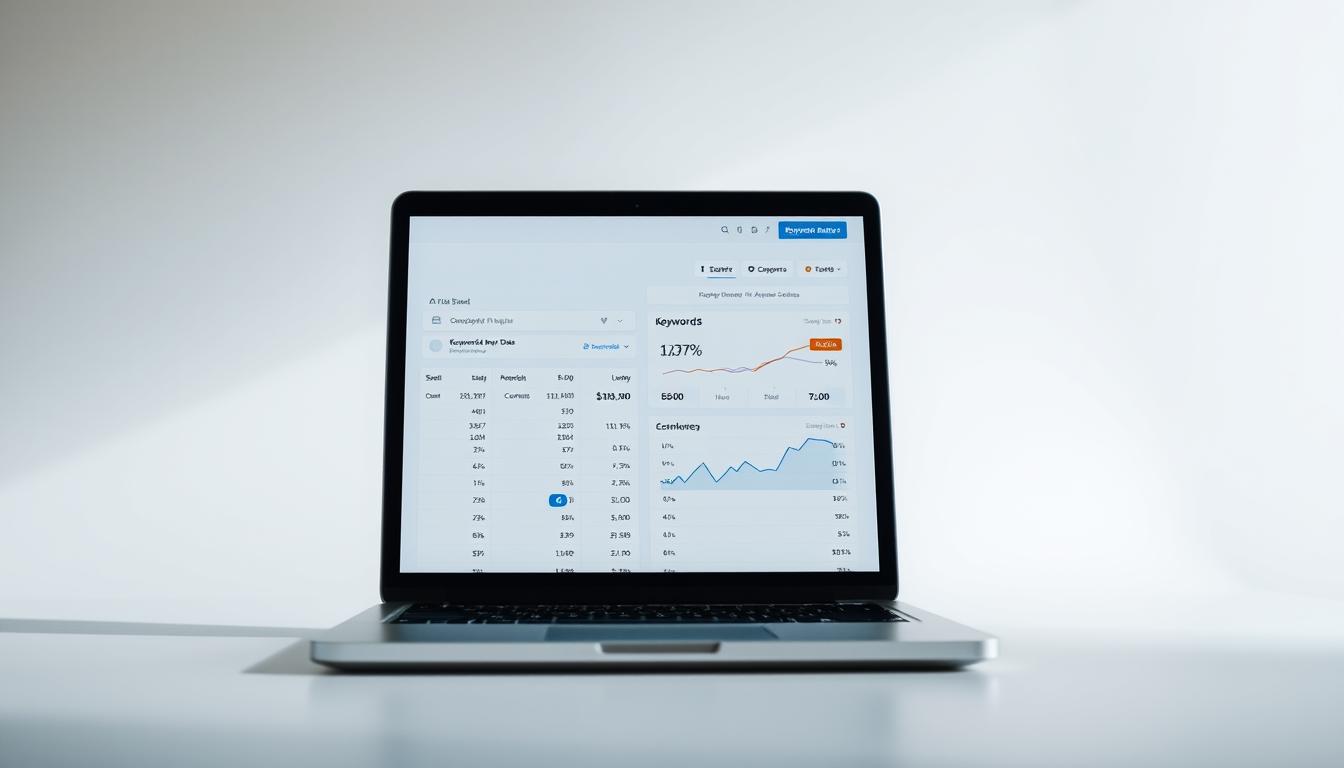
Long-Tail Keyword Opportunities
Long-tail keywords offer a lucrative opportunity for businesses targeting niche markets in India. These keywords are more specific phrases with lower search volumes, but they often have higher conversion rates due to their specificity.
- Long-tail keywords are less competitive, making it easier to rank higher in search results.
- They provide a better alignment with search intent, leading to more relevant traffic.
- Incorporating long-tail keywords into your content strategy can significantly improve your SEO performance.
By leveraging tools like Google Search Console and customer feedback, we can identify long-tail keyword opportunities that resonate with our target audience. As voice search continues to grow, the importance of long-tail keywords and natural language queries becomes even more pronounced.
Metadata Optimization Assessment
Metadata optimization plays a vital role in ensuring your content reaches the intended audience. A well-structured metadata strategy can significantly enhance your website’s visibility on search engines.
Evaluating Title Tags and Meta Descriptions
Title tags and meta descriptions are crucial elements of metadata that directly impact how your pages are displayed in search engine results. Effective title tags should be concise, descriptive, and include target keywords to improve search engine rankings. Similarly, compelling meta descriptions can increase click-through rates by providing a clear summary of the page content.
To optimize these elements, we recommend using an SEO audit tool to detect any missing or irrelevant metadata. This helps prevent issues such as compromised content visibility or duplicate metadata, which can confuse search engines.
Fixing Common Metadata Issues
Common metadata issues include missing or irrelevant metadata, duplicate metadata, and metadata that isn’t optimized for search engines. To address these issues, we will discuss best practices for crafting effective title tags and meta descriptions.
- Crafting title tags that incorporate target keywords while remaining compelling to users.
- Writing meta descriptions that accurately summarize page content and encourage clicks from search results.
- Implementing a consistent metadata structure across the website while ensuring each page has unique metadata.
| Metadata Element | Best Practice | Common Issue |
|---|---|---|
| Title Tags | Include target keywords, be concise and descriptive | Missing or too long |
| Meta Descriptions | Accurately summarize page content, encourage clicks | Duplicate or too short |
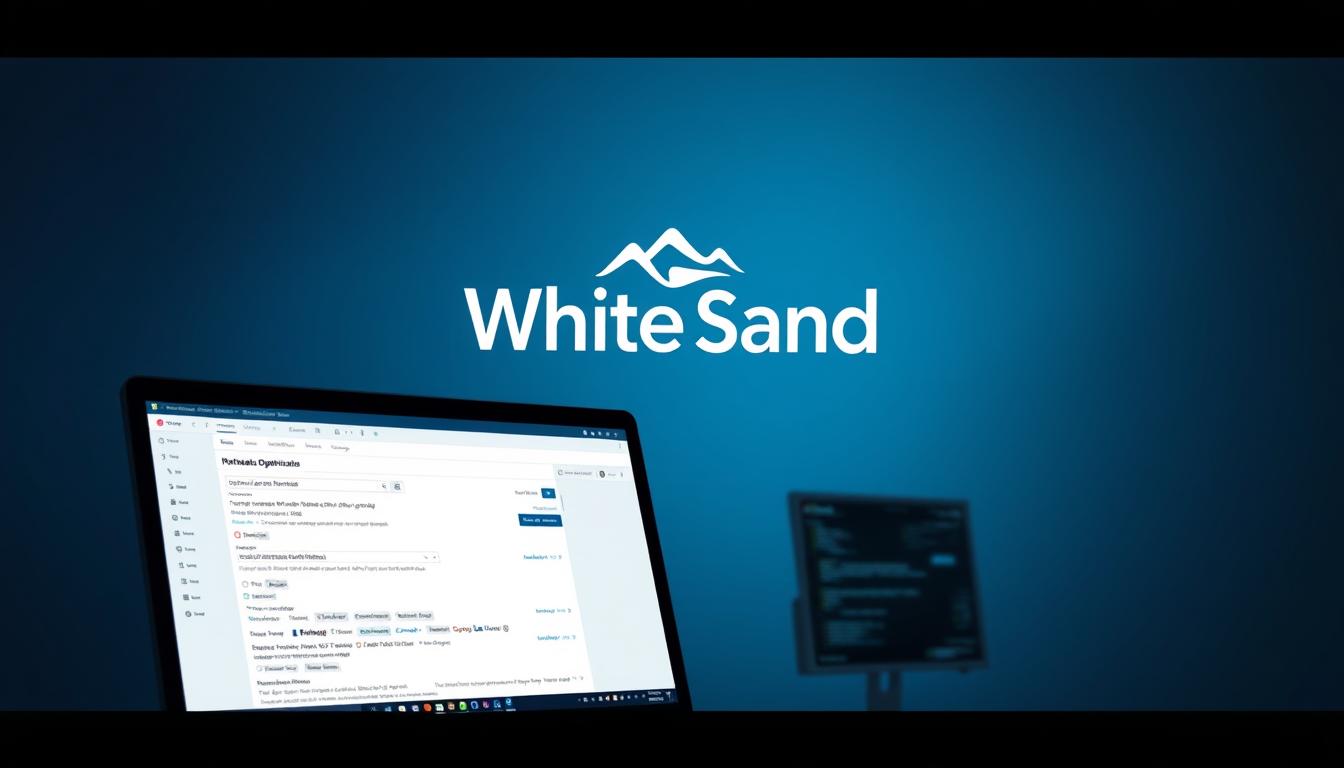
By systematically addressing these common metadata issues and implementing best practices, you can improve your website’s search engine visibility and drive more targeted traffic to your content.
Content Performance Analysis
Understanding how your content is received by users is crucial for a successful SEO strategy. Beyond keyword monitoring and search visibility, it’s essential to analyze how users interact with your website’s content.
Monitoring content marketing metrics helps identify what resonates most with your audience and how they engage with your website. For instance, you might notice significantly more website traffic and higher clickthrough rates for a particular content topic.
Measuring Content Engagement Metrics
Key SEO metrics to measure content engagement include Organic Search Traffic, Bounce Rate, Clickthrough Rate, Pages Per Session, Average Time On Page, and Conversion Rate. These metrics provide insights into how users are interacting with your content.
| Metric | Description | Importance |
|---|---|---|
| Organic Search Traffic | Visitors coming from search engines | High |
| Bounce Rate | Percentage of visitors leaving without interacting | Medium |
| Clickthrough Rate | Percentage of visitors clicking on a link | High |
Identifying Top-Performing Content
Analyzing your content’s performance helps identify top-performing pieces. This involves evaluating metrics such as engagement, traffic, and conversion rates to determine which content topics are most effective.
For example, you might find that certain topics or formats (like videos or infographics) are more engaging for your audience. This information can guide your content creation strategy.
Content Gap Analysis
Content gap analysis is an essential part of a comprehensive SEO analysis. It involves identifying topics and keywords that your competitors are ranking for but your website is not.
- We use search intent analysis to identify content opportunities that align with user needs.
- Analyzing search engine results pages (SERPs) helps identify content types and formats performing well for target keywords.
- Prioritizing content gaps based on potential traffic, competition, and business relevance is crucial.
By conducting a thorough content performance analysis, we can develop a content roadmap that addresses gaps and capitalizes on opportunities, ultimately enhancing your website’s search visibility and user engagement.
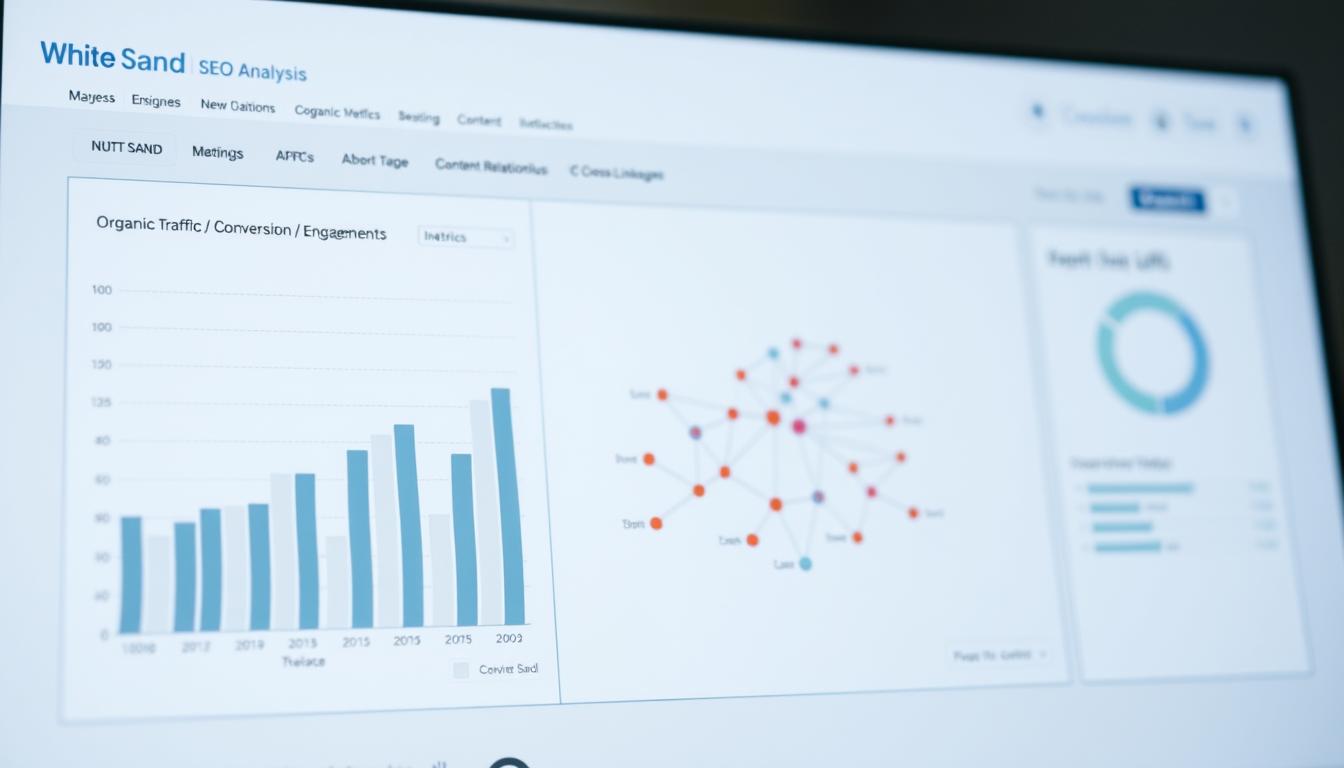
Link Structure Evaluation
A well-structured link profile is crucial for both user experience and search engine optimization (SEO). It not only helps in navigating through the website but also plays a significant role in how search engines rank your site.
Internal and external links are vital components of a website’s link structure. Internal links help users and search engines navigate through the site, while external links add credibility by referencing other high-quality sites.

Internal Linking Assessment
Internal linking is crucial for a website’s structure and SEO. It helps distribute link equity across the site, improving the visibility of key pages. To assess internal linking, we need to identify any issues such as broken links, excessive linking, or orphaned pages.
- Use an SEO audit tool to identify internal link issues.
- Ensure that key pages are easily accessible from the homepage.
- Avoid over-linking, which can dilute link equity.
External Link Quality Check
External links, or outbound links, are links to other websites. They are important for SEO as they can enhance the credibility of your content by referencing high-quality sources. However, linking to low-quality or irrelevant sites can harm your site’s credibility.
To evaluate external link quality, we assess the relevance and authority of the linked sites. We also check for broken links, which can negatively impact user experience and SEO.
- Use tools to identify broken external links.
- Assess the quality and relevance of external links.
- Regularly update external links to maintain content freshness.
By evaluating and optimizing both internal and external linking strategies, we can significantly improve a website’s SEO and user experience. This involves not just identifying and fixing issues but also creating a balanced linking strategy that enhances content value and site authority.
Backlink Profile Analysis
Conducting a backlink profile analysis allows us to evaluate a website’s link equity and identify areas for improvement. This process is crucial for understanding a website’s credibility and search engine ranking.
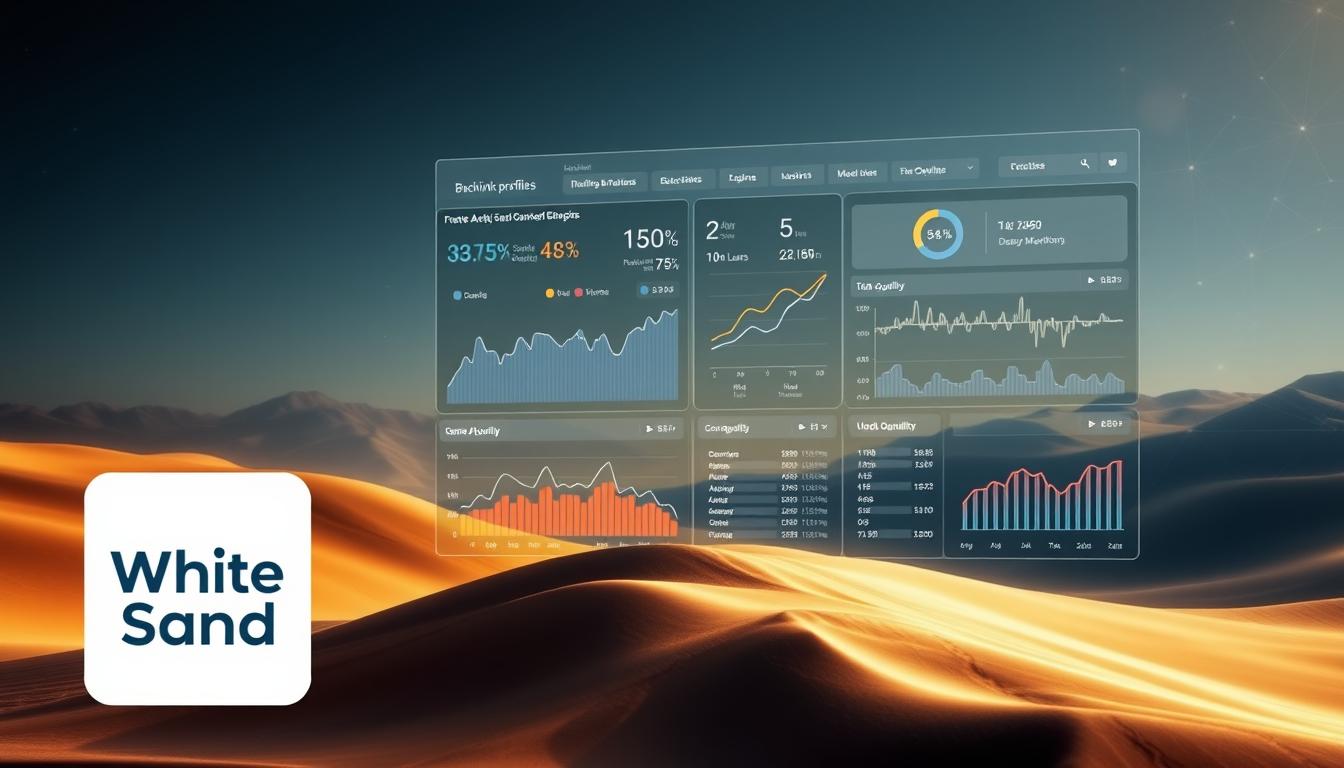
Evaluating Backlink Quality and Quantity
Evaluating the quality and quantity of backlinks is vital for optimizing a website’s search engine performance. We use tools like Ahrefs and Semrush to assess the backlink profile, track changes to backlink volume, and produce an overall backlink quality score. This helps us understand the perceived authority of a website and identify broken or lost backlinks.
Key metrics to consider include:
- Referring domains
- Number of new backlinks
- Backlink quality score
Identifying and Removing Toxic Backlinks
Toxic backlinks can negatively impact a website’s search performance. We identify potentially harmful backlinks using tools like Google Search Console, Ahrefs, and Semrush. Red flags include low-quality domains, irrelevant content, or spammy anchor text.
Once identified, we can disavow toxic backlinks to prevent harm to the website’s SEO. Proactive monitoring of the backlink profile is essential to quickly identify and address toxic links. Regular auditing and ethical link building practices help maintain a healthy backlink profile.
Technical SEO Audit
Ensuring your website is technically sound is key to a successful SEO strategy. A technical SEO audit is a comprehensive analysis that helps identify and fix issues that might be hindering your website’s performance in search engines.
Site Speed Analysis
Site speed is a critical factor in user experience and search engine rankings. A slow-loading website can lead to higher bounce rates and lower conversion rates. We analyze your website’s loading speed and provide recommendations for improvement. This includes optimizing images, leveraging browser caching, and minimizing CSS and JavaScript files.
Key site speed metrics to focus on:
- Page Load Time
- First Contentful Paint
- Time to Interactive
| Metric | Recommended Value | Impact on SEO |
|---|---|---|
| Page Load Time | < 3 seconds | High |
| First Contentful Paint | < 2 seconds | Medium |
| Time to Interactive | < 5 seconds | High |
Mobile Optimization Check
With more than 50 percent of all Internet traffic coming from mobile devices, it’s critical that you have a mobile-friendly website. Google’s adoption of a mobile-first index makes it even more of a priority to support a mobile website. We check your website’s mobile responsiveness, page loading speed on mobile devices, and overall user experience.
Key aspects of mobile optimization:
- Responsive design
- Mobile-friendly content
- Easy navigation on smaller screens
Crawlability and Indexation Issues
Crawlability and indexation are crucial for ensuring that your website’s content is discoverable by search engines. We analyze your website’s crawl efficiency using tools like Google Search Console and log file analyzers, identify common crawlability issues, and provide tips for improving crawlability and indexation.
Common crawlability issues:
- Robots.txt errors
- Crawl budget waste
- Orphaned pages
By addressing these technical SEO aspects, you can significantly improve your website’s visibility and ranking in search engine results.
User Experience and Website Performance
User experience and website performance are intertwined, playing a significant role in determining the success of your online presence. A positive user experience reduces bounce rates, enhances engagement, and attracts more organic visitors. Keeping an eye on website performance metrics is easier than you think. Simply use a platform like Google Lighthouse to monitor page load time, which often determines whether a user exits a website.
Page Load Time Assessment
Page load time is a critical factor in user experience and SEO. A slow-loading website can lead to higher bounce rates and lower search engine rankings. To assess page load time, we use tools like Google Lighthouse, which provides insights into loading speeds and identifies areas for improvement. Optimizing images, leveraging browser caching, and minimizing CSS/JS files are some strategies to enhance page load times.
By improving page load times, we not only enhance user experience but also improve our website’s visibility on search engines. It’s a win-win situation that requires careful analysis and implementation of best practices.
Accessibility and Best Practices Evaluation
Web accessibility is crucial for ensuring that all users, including those with disabilities, can navigate and interact with your website. Evaluating accessibility involves using tools like WAVE, axe, and Lighthouse to identify issues such as missing alt text, improper heading structure, and non-descriptive link text. Key aspects to assess include color contrast, keyboard navigation, and screen reader compatibility.
| Accessibility Aspect | Description | Tools to Evaluate |
|---|---|---|
| Color Contrast | Ensuring sufficient contrast between text and background | WAVE, Lighthouse |
| Keyboard Navigation | Allowing users to navigate using only their keyboard | axe, Lighthouse |
| Screen Reader Compatibility | Ensuring content is readable by screen readers | WAVE, axe |
By focusing on accessibility and adhering to web best practices, we can significantly enhance user experience and improve our website’s SEO performance. This includes providing alternative text for images, structuring content with proper headings, and ensuring that all interactive elements are accessible via keyboard navigation.
Implementing SEO Improvements Based on Analysis
With a comprehensive SEO analysis in hand, it’s time to prioritize and address the identified issues. Implementing SEO improvements is a critical step towards enhancing your website’s visibility and driving more traffic to your site.
Prioritizing SEO Issues
The first step in implementing SEO improvements is to prioritize the issues identified during the analysis. This involves assessing the severity of each issue and its potential impact on your website’s search results and overall traffic. By focusing on the most critical issues first, you can maximize the effectiveness of your SEO efforts.
Creating an Action Plan
Once the issues are prioritized, the next step is to create a detailed action plan. This plan should outline the specific steps needed to address each issue, along with the resources required and a timeline for implementation. For instance, if the analysis reveals that your website’s metadata optimization is lacking, your action plan should include revising title tags and meta descriptions to better reflect your target keywords.
“The key to successful SEO is not just identifying issues, but also implementing the right solutions at the right time.”
Measuring Implementation Success
After implementing the SEO improvements, it’s crucial to measure their success. This involves tracking key performance indicators (KPIs) such as changes in website traffic, search engine rankings, and overall data on how users interact with your site. By analyzing these metrics, you can determine the effectiveness of your SEO efforts and make informed decisions about future improvements.
To measure implementation success, we establish clear metrics and KPIs, set up tracking and reporting systems, and conduct before-and-after comparisons to quantify the impact of specific changes. We also analyze the relationship between SEO implementations and business outcomes, using these insights to refine and optimize ongoing SEO efforts.
Competitor SEO Analysis
To stay ahead in the Indian digital market, it’s essential to conduct a thorough competitor SEO analysis. This process involves identifying your digital competitors, analyzing their strategies, and finding opportunities to outperform them.
Identifying Your Digital Competitors in India
The first step in competitor SEO analysis is to identify your digital competitors in the Indian market. This involves searching for keywords related to your business and analyzing the top-ranking websites. Tools like Semrush’s Advertising Research can help you discover where your competitors are investing in search ads, potentially uncovering profitable SEO keywords.
Analyzing Competitor Strategies
Once you’ve identified your competitors, the next step is to analyze their SEO strategies. This includes evaluating their keyword usage, content quality, and link building efforts. By understanding what works for your competitors, you can identify gaps and opportunities in the market.
Finding Competitive Advantages
Analyzing your competitors’ weaknesses and areas where your website can outperform them is crucial. This involves identifying underserved search intents and content opportunities that your competitors have missed. By leveraging these insights, you can develop a unique value proposition that differentiates your website in search results.
By conducting a thorough competitor SEO analysis, you can gain valuable insights into the competitive landscape of your industry in India. This information can be used to refine your SEO strategy, improve your search engine rankings, and drive more traffic to your website.
Measuring ROI from Professional SEO Analysis
To understand the true value of professional SEO analysis, it’s crucial to measure its return on investment (ROI) effectively. We achieve this by tracking key performance indicators (KPIs) that reflect the impact of our SEO efforts on the business.
Key Performance Indicators to Track
To gauge the success of our SEO analysis, we monitor several critical KPIs. These include organic search traffic, which indicates how many visitors are reaching our site through search engines. We also track keyword rankings to see how our target keywords are performing over time. Additionally, we analyze conversion rates to understand how effectively our SEO efforts are driving desired actions on our website.
By examining these KPIs, we can assess the effectiveness of our SEO strategy and make informed decisions about future optimizations.
Reporting and Analysis Timeframes
Establishing the right timeframes for measuring and reporting SEO results is crucial. We consider the type of improvements implemented and their expected impact on our SEO performance. For instance, some changes may have an immediate effect, while others may take time to mature.
We set up regular reporting cadences that align with our business cycles and stakeholder expectations. This enables us to analyze SEO performance trends over time, identifying patterns, seasonality, and long-term growth. We also account for external factors and algorithm updates when analyzing our SEO performance, ensuring that our insights are accurate and actionable.
By adopting a structured approach to measuring SEO ROI, we can demonstrate the value of our SEO efforts to stakeholders and drive continuous improvement in our digital marketing strategies.
Tools for Professional SEO Analysis
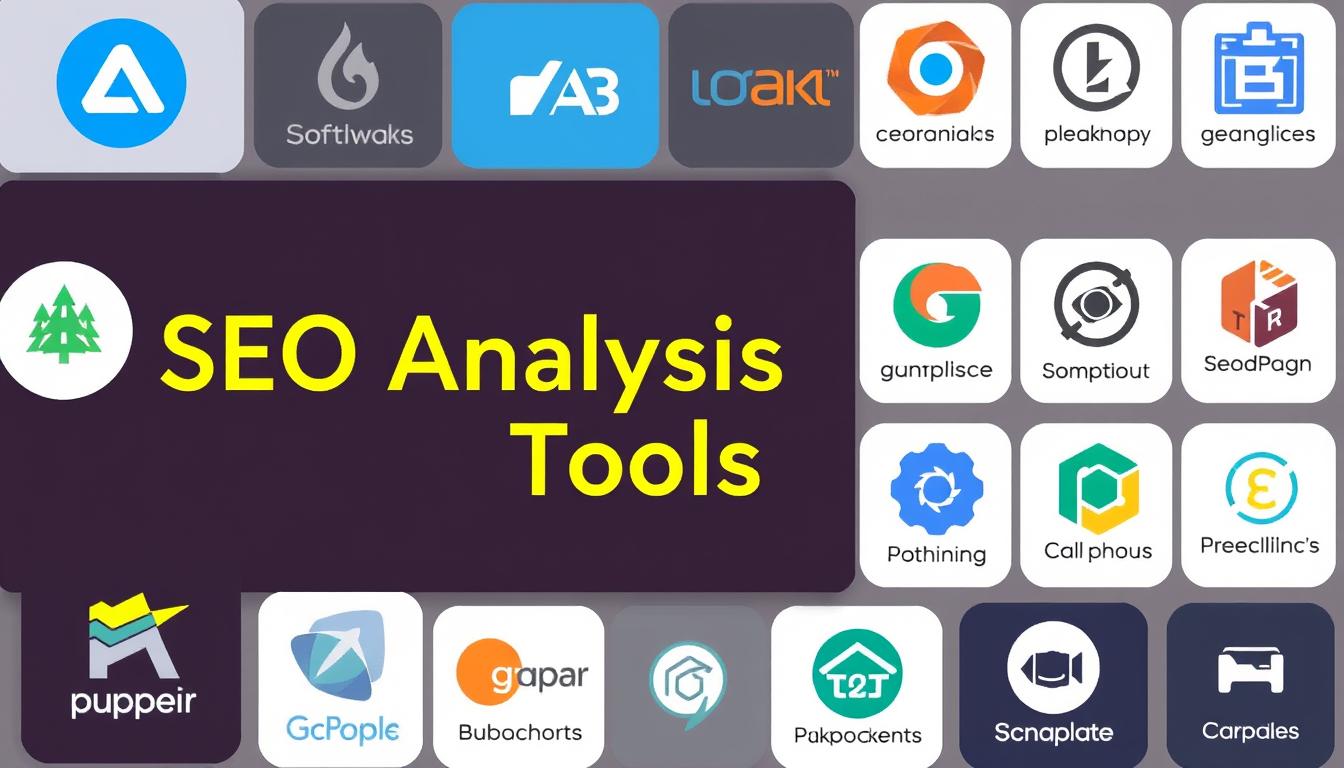
A comprehensive SEO analysis requires a combination of technical expertise and the right analytical tools. To achieve top search engine rankings, it’s essential to utilize a variety of specialized tools that can help in keyword research, competitor analysis, technical audits, and more.
Free SEO Analysis Tools
For those just starting out or on a tight budget, there are several free SEO analysis tools available. These tools can provide valuable insights into website performance, keyword rankings, and backlink profiles. Some popular free tools include Google Search Console, Google Analytics, and keyword research tools like Google Keyword Planner.
Premium SEO Analysis Platforms
For more advanced and comprehensive SEO analysis, premium tools are indispensable. These platforms offer a wide range of features and in-depth analysis capabilities. Some of the leading premium SEO analysis platforms include:
Ahrefs: Known for its robust backlink analysis and keyword research capabilities. Ahrefs provides a clean and user-friendly interface, making it easier to navigate and understand complex SEO data.
Semrush: An all-in-one SEO platform that offers tools for keyword research, competitor analysis, and technical audits. Semrush is highly regarded for its comprehensive suite of SEO tools.
Screaming Frog SEO Spider: A desktop crawler that can mass crawl multiple URLs and identify backlink issues, automating the detection of broken links. This tool is particularly useful for technical SEO audits.
When selecting premium SEO tools, it’s crucial to evaluate their features, benefits, and ROI based on specific business needs and budget. By integrating these tools with existing workflows and free tools, businesses can maximize their SEO analysis capabilities.
Why Choose Whitesand India for Your Professional SEO Analysis
Our team at Whitesand India is dedicated to providing top-notch professional SEO analysis that helps businesses thrive in the competitive Indian market. With our expertise and experience, we deliver comprehensive SEO analysis services tailored to businesses across various industries.
We employ a data-driven approach to SEO analysis, combining advanced tools with human expertise to deliver actionable insights. Our deep understanding of the Indian market and search landscape enables us to develop tailored SEO strategies for local businesses.
- Comprehensive SEO methodology covering technical foundations to content strategy
- Proven track record of success in improving search visibility, organic traffic, and online conversions
- Client-centric approach focusing on understanding business goals and delivering measurable results
- Transparent reporting and communication practices
- Competitive pricing and flexible service options
| Service | Description | Benefit |
|---|---|---|
| Professional SEO Analysis | Comprehensive analysis of your website’s SEO | Improved search visibility and organic traffic |
| Data-Driven Approach | Use of advanced tools and human expertise | Actionable insights for business growth |
| Client-Centric Approach | Understanding business goals and delivering measurable results | Measurable ROI and business success |
For more information about our professional SEO analysis services, please contact us at deepali@whitesand.co.in or (+91)98259-40020. Visit our website at https://whitesand.co.in/.
Conclusion
Ultimately, a professional SEO analysis is the key to unlocking your website’s full potential. Throughout this article, we’ve explored the critical components of SEO analysis, from understanding its importance to implementing improvements based on the insights gained.
A comprehensive SEO analysis is not a one-time task but an ongoing process that requires regular monitoring and adjustments to stay ahead of the competition. By covering on-page, off-page, and technical SEO aspects, businesses can ensure they’re visible to their target audience on search engines.
The insights gained from a professional SEO analysis can inform strategic decisions, drive business growth, and enhance online presence. For businesses in India, working with experienced SEO professionals like Whitesand India can make a significant difference in navigating the complexities of search algorithms and the local market.
We encourage you to take the next step by conducting a professional SEO analysis of your website or reaching out to Whitesand India for expert assistance. For more information, contact us at deepali@whitesand.co.in or call us at (+91)98259-40020. Visit https://whitesand.co.in/ to learn more about our services.
As SEO continues to evolve, staying ahead of the curve with professional analysis and strategy is crucial. By partnering with a seasoned marketing agency like Whitesand India, you can ensure your business remains competitive in the ever-changing digital landscape.
FAQ
What is the primary goal of a comprehensive SEO analysis?
The primary goal of a comprehensive SEO analysis is to identify areas of improvement for our website’s search engine ranking, driving more organic traffic, and increasing online visibility.
How often should we conduct an SEO analysis?
We recommend conducting an SEO analysis at least once a quarter to stay on top of the latest search engine algorithm updates and to identify new opportunities for growth.
What are the key elements of on-page SEO?
On-page SEO elements include title tags, meta descriptions, header tags, content optimization, and internal linking, all of which play a crucial role in improving our website’s search engine ranking.
How do we identify high-value keywords for our Indian audience?
We use tools like Google Keyword Planner and Ahrefs to identify relevant keywords with high search volume and low competition, ensuring our content resonates with our target audience.
What is the significance of backlink quality and quantity in SEO?
High-quality backlinks from authoritative sources improve our website’s credibility and search engine ranking, while low-quality backlinks can harm our online reputation.
How can we measure the success of our SEO implementation?
We track key performance indicators (KPIs) such as organic traffic, search engine ranking, and conversion rates to measure the success of our SEO efforts and make data-driven decisions.
What are some free SEO analysis tools we can use?
Some free SEO analysis tools include Google Search Console, Google Analytics, and SEMrush’s free version, which provide valuable insights into our website’s performance.
How does technical SEO impact our website’s user experience?
Technical SEO elements like site speed, mobile optimization, and crawlability directly impact our website’s user experience, influencing engagement metrics and conversion rates.
Can we conduct an SEO analysis ourselves, or do we need to hire an expert?
While we can conduct a basic SEO analysis ourselves, hiring an expert like Whitesand India can provide a more comprehensive and actionable analysis, driving better results.
